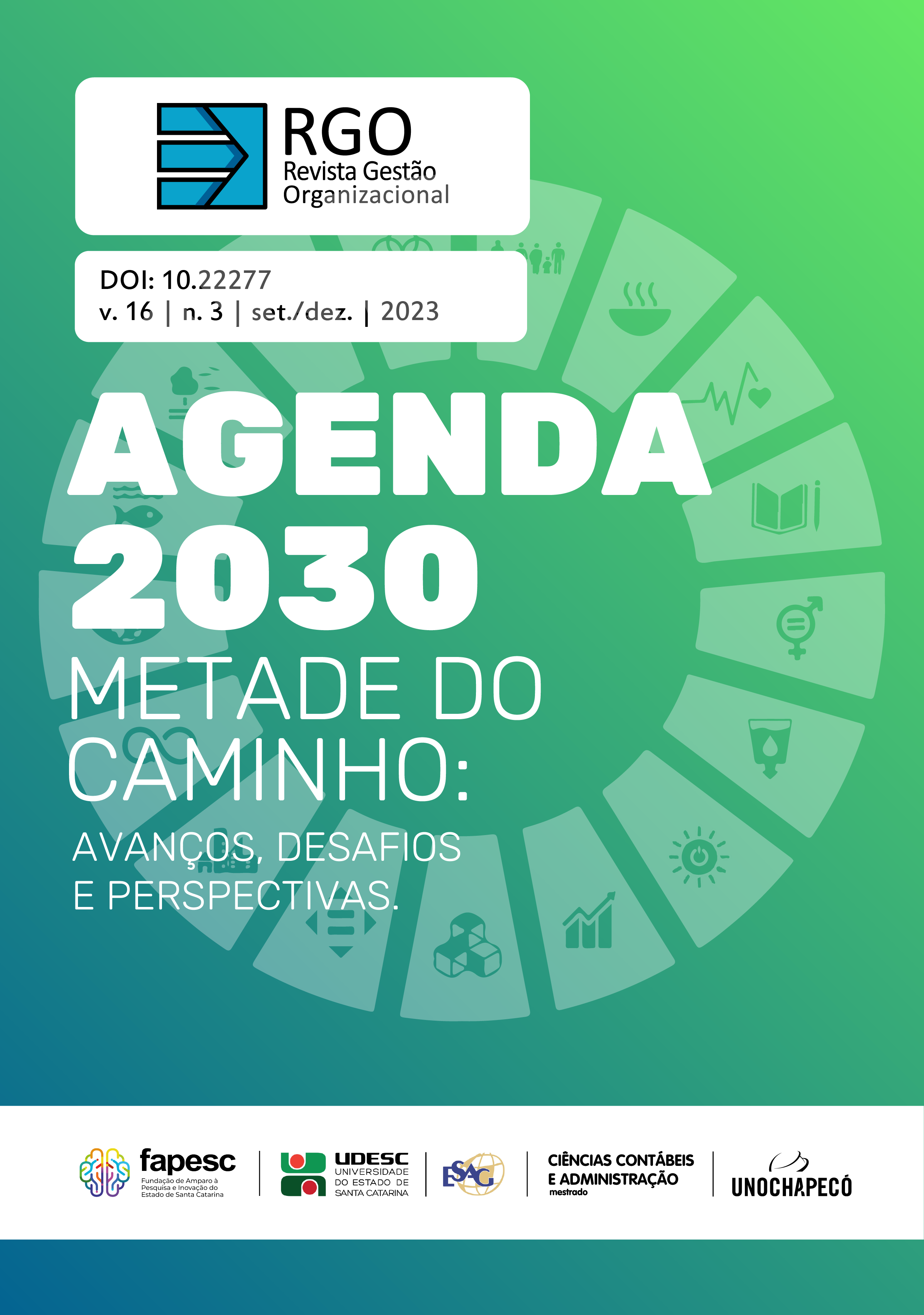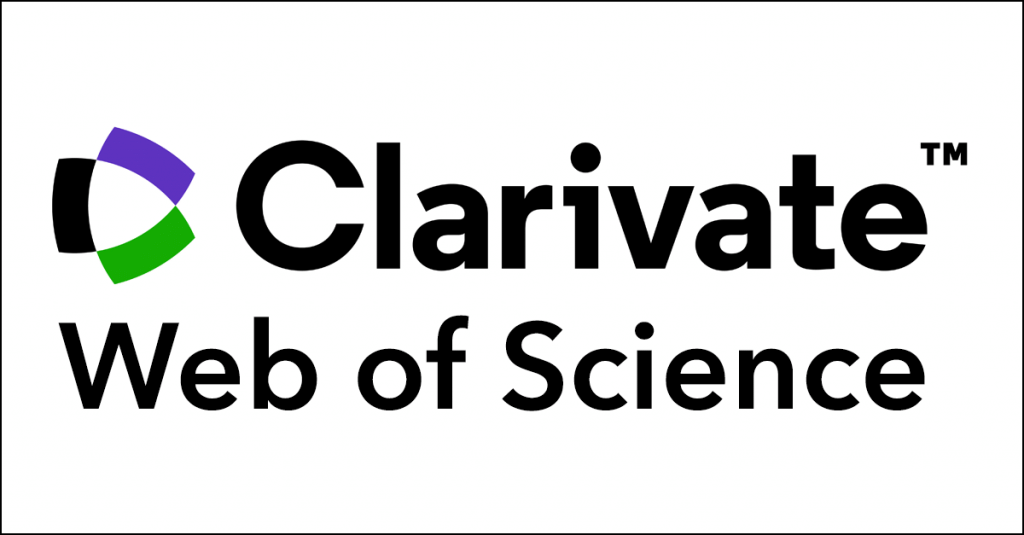IMPACT OF THE COVID-19 PANDEMIC ON CONSUMER BEHAVIOR DURING SOCIAL ISOLATION AND SUSTAINABLE CONSUMPTION: A PERSPECTIVE IN BRAZIL AND PORTUGAL
DOI:
https://doi.org/10.22277/rgo.v16i3.7287Palavras-chave:
Pandemic COVID-19. Consumer behavior. Social isolation. Sustainable consumption.Resumo
Purpose: This study aims to analyze the impact of the COVID-19 Pandemic on consumer behavior in social isolation and sustainable consumption, from the perspective of the 2030 Agenda, given the perception of 2403 residents in Brazil and Portugal, through four research hypotheses.
Method/approach: The methodology used was quantitative and descriptive research, through exploratory factor analysis and multiple linear regression.
Main findings: The results highlight that all hypotheses were confirmed, and the most relevant relationship, that is, the most significant impact, occurred between the COVID-19 Pandemic and consumer behavior in social isolation, as well as differences in the perception of respondents between the Countries.
Theoretical, practical/social contributions: Regarding the managerial and social contributions of the research, they allow managers and health professionals to have knowledge about the impacts of the COVID-19 Pandemic, assisting them in developing strategies to face the Pandemic. In addition to information for public policies at the regional and national le’vels to support cities and regions in facing the Pandemic.
Originality/relevance: Another important contribution of the research is the availability of an analysis framework, which has been statistically validated (observable variables and constructs). In this context, the Framework proposed in the research can be replicated in different regional, national, and international contexts.
Downloads
Referências
Acter, T., Uddin, N., Das, J., Akhter, A., Choudhury, T. R., Kim, S. (2020). Evolution of severe acute respiratory syndrome coronavirus 2 (SARS-CoV-2) as coronavirus disease 2019 (COVID-19) pandemic: A global health emergency. Science of the Total Environment, 730, 138996. https://doi.org/10.1016/j.scitotenv.2020.138996
Ali, M., Shah, S. T. H., Imran, M., Khan, A. (2020). The role of asymptomatic class, quarantine and isolation in the transmission of COVID-19. Journal of Biological Dynamics, 14(1), 389-408. https://doi.org/10.1080/17513758.2020.1773000
Bagozzi, R. P., Yi, Y. (1991). Multitrait-multimethod matrices in consumer research. Journal of Consumer Research, 17(4), 426-439. https://doi.org/10.1086/208568
Baumann, S. E., Burke, J. G. (2023). Creating community during COVID-19: A virtual art gallery to address social isolation during a pandemic. Health Promotion Practice, 24(1), 9-11. https://doi.org/10.1177/15248399211064638
Blake, H., Bermingham, F., Johnson, G., Tabner, A. (2020). Mitigating the psychological impact of COVID-19 on healthcare workers: a digital learning package. International Journal of Environmental Research and Public Health, 17(9), 2997. https://doi.org/10.3390/ijerph17092997
Carbone, S. R. (2020). Flattening the mental ill-health curve: the importance of primary prevention in managing the mental health impacts of COVID19. Mental Health and Prevention, 19, 200185. https://doi.org/10.1016/j.mhp.2020.200185
Coccia, M. (2020). Factors determining the diffusion of COVID-19 and suggested strategy to prevent future accelerated viral infectivity similar to COVID. Science of the Total Environment, 729, 138474. https://doi.org/10.1016/j.scitotenv.2020.138474
Coronavírus Brasil. (2020). https://covid.saude.gov.br/
Coronavírus Brasil. (2023). https://covid.saude.gov.br/
DGS - Direção Geral de Saúde. (2020). Relatório de situação epidemiológica em Portugal, Covid-19, A evolução da COVID - 19 em Portugal. https://covid19.min-saude.pt/
Fattorini, D., Regoli, F. (2020). Role of the chronic air pollution levels in the Covid-19 outbreak risk in Italy. Environmental Pollution, 264, 114732. https://doi.org/10.1016/j.envpol.2020.114732
Goffman, E. (2020). In the wake of COVID-19, is glocalization our sustainability future? Sustainability: Science, Practice and Policy, 16(1), 48-52. https://doi.org/10.1080/15487733.2020.1765678
Gupta, S., Gentry, J. W. (2019). Should i buy, hoard, or hide? - Consumers’ responses to perceived scarcity. The International Review of Retail, Distribution and Consumer Research, 29(2), 178-197. https://doi.org/10.1080/09593969.2018.1562955
Hair Jr. J. F., Black, W. C., Bardin, B. J., Anderson, R. E. (2013). Multivariate data analysis: Pearson new international edition. 7ed. Pearson Education Limited, New York.
Hsu, L.Y., Chia, P.Y., Vasoo, S. (2020). A midpoint perspective on the COVID-19 pandemic. Singapore Medical Journal, 61(7), p. 381-383. https://doi.org/10.11622/smedj.2020036
Ietto, G. (2020). SARS-CoV-2: reasons of epidemiology of severe ill disease cases and therapeutic approach using trivalent vaccine (tetanus, diphtheria and Bordetella pertussis). Medical Hypotheses, 141, 109779. https://doi.org/10.1016/j.mehy.2020.109779
INPE - Instituto Nacional de Pesquisas Espaciais. (2020). http://www.inpe.br/noticias/?chave=desmatamento&mes=&ano=
Iqra, Iqbal., Aisha, Hakim., Tülay, Atay. (2022). Isolation among university students during the covid-19 lockdown: the mediating impacts of social sites usage and pursuing social support. International Journal of Media and Information Literacy, 7(2), 441-4496. https://doi.org/10.13187/ijmil.2022.2.441
Jabali, O., Ayyoub, A. A., Suliaman, M. (2023). Levels of psychological stress and social isolation among palestinian media professionals working in palestinian media institutions during Covid-19 Pandemic. Studies in Systems, Decision and Control, 216, 403-4112. https://doi.org/10.1007/978-3-031-10212-7_34
Jribi, S., Ben Ismail, H., Doggui, D., Debbabi, H. (2020). COVID-19 virus outbreak lockdown: What impacts on household food wastage? Environment, Development and Sustainability, 22, 3939-3955. https://doi.org/10.1007/s10668-020-00740-y
Kirk, C. P., Rifkin, L. S. (2020). I'll Trade You Diamonds for Toilet Paper: Consumer Reacting, Coping and Adapting Behaviors in the COVID-19 Pandemic. Journal of Business Research, 117, 124-131. https://doi.org/10.1016/j.jbusres.2020.05.028
Leal Filho, W., Salvia, A. L., Paço, A., Dinis, M. A. P., Vidal, D. G., Da Cunha, D. A., de Vasconcelos, C. R., Baumgartner, R. J., Rampasso, I., Anholon, R., Doni, F., Sonetti, G. (2022). The influences of the COVID-19 pandemic on sustainable consumption: an international study. Environmental Sciences Europe, 34(1), 1-17. https://doi.org/10.1186/s12302-022-00626-y
Lee, J., Spratling, R. (2019). Recruiting mothers of children with developmental disabilities: adaptations of the snowball sampling technique using social media. Journal of Pediatric Health Care, 33(1), 107-110. https://doi.org/10.1016/j.pedhc.2018.09.011
Liu, Y., Song, W. (2020). Modelling crop yield, water consumption, and water use efficiency for sustainable agroecosystem management. Journal of Cleaner Production, 253, 119940. https://doi.org/10.1016/j.jclepro.2019.119940
Lo, A.Y., Liu, S. (2018). Towards sustainable consumption: A socio-economic analysis of household waste recycling outcomes in Hong Kong. Journal of Environmental Management, 214, 416-425. https://doi.org/10.1016/j.jenvman.2018.03.029
Mediouni, M., Madiouni, R., Kaczor-Urbanowicz, K. E. (2020). COVID-19: How the quarantine could lead to the depreobesity. Obesity Medicine, 19, 100255. https://doi.org/10.1016/j.obmed.2020.100255
Milica, Đ.; Milica, J. (2020). Productive Employment and Working Conditions as Determinants of Sustainable Economic Development in Serbia. Studies in Business and Economics, 14(3) 84-96. https://doi.org/10.2478/sbe-2019-0045
Mishra, B. K., Keshri, A. K., Rao, Y. S., Mishra, B. K., Mahato, B., Ayesha, S., Rukhaiyyar, B. P., Saini, D. K., Singh, A. K. (2020). COVID-19 created chaos across the globe: Three novel quarantine epidemic models. Chaos, Solitons & Fractals, 138, 109928. https://doi.org/10.1016/j.chaos.2020.109928
Musinguzi, G., Asamoah, B. O. (2020). The Science of Social distancing and total lock down: does it work? Whom does it benefit? Electronic Journal of General Medicine, 17(6), 230. https://doi.org/10.29333/ejgm/7895
Pantano, E., Pizzi, G., Scarpi, D., Dennis, C. (2020). Competing during a pandemic? Retailers’ ups and downs during the COVID-19 outbreak. Journal of Business Research, 116, 209-213. https://doi.org/10.1016/j.jbusres.2020.05.036
Rana, W., Mukhtar, S., Mukhtar, S. (2020). Mental health of medical workers in Pakistan during the pandemic COVID-19 outbreak. Asian Journal of Psychiatry, 51, 102080. https://doi.org/10.1016/j.ajp.2020.102080
Renzi, M. F., Ungaro, V., Di Pietro, L., Guglielmetti, M., Pasca, M. G. (2022). Agenda 2030 and COVID-19: A young consumer’s perception of sustainable consumption. Sustainability, 14(23), 15627. https://doi.org/10.3390/su142315627
Robinson, S. G., Brady, M. K., Lemon, K. N., Giebelhausen, M. (2016). Less of this one? I'll take it: new insights on the influence of shelf-based scarcity. International Journal of Research in Marketing, 33(4), 961-965. https://doi.org/10.1016/j.ijresmar.2016.03.005
Sarkis, J., Cohen, M.J., Dewick, P., Schröder, P. (2020). A brave new world: lessons from the COVID-19 Pandemic for transitioning to sustainable supply and production. Resources, Conservation, and Recycling, 159, 104894. https://doi.org/10.1016/j.resconrec.2020.104894
Serviço Nacional de Saúde. (2023). https://www.insa.min-saude.pt/category/areas-de-atuacao/epidemiologia/covid-19-curva-epidemica-e-parametros-de-transmissibilidade/
Severo, E. A., De Guimarães, J. C. F., Dellarmelin, M. L. (2021). Impact of the COVID-19 pandemic on environmental awareness, sustainable consumption and social responsibility: Evidence from generations in Brazil and Portugal. Journal of Cleaner Production, 286, 124947. https://doi.org/10.1016/j.jclepro.2020.124947
Severo, E. A., Guimarães, J. C. F., Silva Oliveira, N. Q. (2022). Sustainable development goals towards eco-innovation: A survey Brazil. Journal of Urban Technology and Sustainability, 5(1), e41-e41. https://doi.org/10.47842/juts.v5i1.41
Siciliano, B., Dantas, G., Silva, C. M., Arbilla, G. (2020). Increased ozone levels during the COVID-19 lockdown: Analysis for the city of Rio de Janeiro, Brazil. Science of The Total Environment, 737, 139765. https://doi.org/10.1016/j.scitotenv.2020.139765
Sidor, A., Rzymski, P. (2020). Dietary Choices and Habits during COVID-19 Lockdown: Experience from Poland. Nutrients, 12(6), 1657. https://doi.org/10.3390/nu12061657
Sofo, A., Sofo, A. (2020). Converting home spaces into food gardens at the time of Covid-19 quarantine: all the benefits of plants in this difficult and unprecedented period. Human Ecology, 48 (2), 131-139. https://doi.org/10.1007/s10745-020-00147-3
Valenzuela-Fernández, L., Guerra-Velásquez, M., Escobar-Farfán, M., García-Salirrosas, E. E. (2022). Influence of COVID-19 on environmental awareness, sustainable consumption, and social responsibility in latin american countries. Sustainability, 14(19), 12754. https://doi.org/10.3390/su141912754
Xiang, Y. T., Yang, Y., Li, W., Zhang, L., Zhang, Q., Cheung, T., Ng, C. H. (2020). Timely mental health care for the 2019 novel coronavirus outbreak is urgently needed. The Lancet Psychiatry, 7(3), 228-229. https://doi.org/10.1016/S2215-0366(20)30046-8
Zambrano-Monserrate, M. A., Ruano, M.A., Sanchez-Alcalde, L. (2020). Indirect effects of COVID-19 on the environment. Science of The Total Environment, 728, 138813. https://doi.org/10.1016/j.scitotenv.2020.138813
Zheng, W. (2020). Mental health and a novel coronavirus (2019-nCoV) in China. Journal of Affective Disorders, 269, 201-202. https://doi.org/10.1016/j.jad.2020.03.041
Downloads
Publicado
Como Citar
Edição
Seção
Licença
Estou ciente de que, em sendo aprovado, a publicação do artigo será no formato on-line na RGO.
Também tenho ciência de que há autorização para assumir contratos adicionais separadamente, para distribuição não-exclusiva da versão do trabalho publicada nesta revista (ex.: publicar em repositório institucional ou como capítulo de livro), com reconhecimento de autoria e publicação inicial nesta revista.
Do ponto de vista do Creative Commons, a Revista Gestão Organizacional é de acesso aberto e irrestrito, porém não permitindo adaptações nos artigos, nem o uso comercial.
Sobre a licença Creative Commons: As licenças e instrumentos de direito de autor e de direitos conexos da Creative Commons forjam um equilíbrio no seio do ambiente tradicional “todos os direitos reservados” criado pelas legislações de direito de autor e de direitos conexos. Os nossos instrumentos fornecem a todos, desde criadores individuais até grandes empresas, uma forma padronizada de atribuir autorizações de direito de autor e de direitos conexos aos seus trabalhos criativos. Em conjunto, estes instrumentos e os seus utilizadores formam um corpo vasto e em crescimento de bens comuns digitais, um repositório de conteúdos que podem ser copiados, distribuídos, editados, remixados e utilizados para criar outros trabalhos, sempre dentro dos limites da legislação de direito de autor e de direitos conexos.
A Revista Gestão Organizacional adota o sistema: Atribuição-SemDerivações-SemDerivados CC BY-NC-ND: Permite o download dos seus trabalhos e o compartilhemento desde que atribuam crédito, mas sem que possam alterá-los de nenhuma forma ou utilizá-los para fins comerciais.























